A herniated disc, also known as a slipped or ruptured disc, is a common spinal condition that can cause significant pain and discomfort. This condition occurs when the soft gel-like center of a spinal disc pushes through a tear in the tougher exterior. Herniated discs can affect individuals of all ages and often arise from age-related wear and tear. For those seeking expert diagnosis and management, visiting the Best Orthopedic Hospital in Jaipur can provide the necessary care and treatment options. Understanding the causes, symptoms, and available treatments for herniated discs is essential for effective management and recovery.
Causes of Herniated Discs
Herniated discs can result from a variety of factors, including:
- Age-Related Degeneration: As people age, the discs in the spine naturally lose hydration and elasticity, making them more prone to injury. This degeneration can lead to cracks or tears in the disc’s outer layer.
- Repetitive Strain or Injury: Repeatedly lifting heavy objects, bending, or twisting motions can put excessive stress on the spine, contributing to disc herniation.
- Trauma: Accidents or falls can cause sudden and severe pressure on the spine, leading to disc herniation. A traumatic injury may result in a complete rupture of the disc.
- Genetics: A family history of herniated discs or spinal disorders may increase the likelihood of developing this condition.
- Obesity: Excess body weight places additional stress on the spine, making it more vulnerable to herniated discs.
- Sedentary Lifestyle: A lack of physical activity can weaken the muscles that support the spine, increasing the risk of injury.
Recognizing these factors can help individuals take preventive measures to protect their spinal health.
Symptoms of Herniated Discs
The symptoms of a herniated disc can vary depending on the location of the herniation and whether it is pressing on nearby nerves. Common symptoms include:
- Pain: The most prominent symptom is pain, which may be localized in the back or neck or radiate to other areas, such as the arms or legs. Pain intensity can range from mild to severe.
- Numbness or Tingling: Individuals may experience numbness, tingling, or a pins-and-needles sensation in the extremities due to nerve compression.
- Weakness: Muscle weakness in the affected limb may occur, making it difficult to perform daily activities. For example, a herniated disc in the lower back can affect the legs, while one in the neck may impact the arms.
- Loss of Reflexes: Reflexes may be diminished or absent, indicating nerve involvement.
- Difficulty with Mobility: Severe cases may result in difficulty standing, walking, or sitting comfortably, impacting overall quality of life.
If these symptoms persist or worsen, it is essential to consult a healthcare provider for an accurate diagnosis and treatment plan.
Diagnosis of Herniated Discs
Diagnosing a herniated disc typically involves a combination of medical history, physical examination, and imaging tests. During the physical examination, the healthcare provider will assess:
- Range of motion
- Muscle strength
- Reflexes
- Sensation in the affected areas
Imaging tests, such as X-rays, MRI, or CT scans, may be ordered to confirm the diagnosis and evaluate the extent of the herniation.
Treatment Options for Herniated Discs
Treatment for herniated discs aims to relieve pain, restore function, and improve quality of life. Options include:
- Conservative Treatments:
- Rest: Short periods of rest can help alleviate inflammation and reduce pain.
- Physical Therapy: A tailored physical therapy program can strengthen core muscles, improve flexibility, and provide techniques for pain management.
- Medications: Nonsteroidal anti-inflammatory drugs (NSAIDs), muscle relaxants, and corticosteroids can help reduce pain and inflammation.
- Injections: In some cases, corticosteroid injections may be administered to reduce inflammation around the affected nerve roots.
- Surgery: If conservative treatments fail to provide relief, surgical options may be considered. Common procedures include:
- Discectomy: Removal of the portion of the disc that is pressing on the nerve.
- Laminectomy: Removal of a small section of the vertebra to relieve pressure on the nerves.
- Spinal Fusion: In cases of severe degeneration, adjacent vertebrae may be fused to stabilize the spine.
- Alternative Therapies: Some individuals may find relief through chiropractic care, acupuncture, or massage therapy. Always consult a healthcare provider before starting alternative treatments.
Recovery and Prognosis
The prognosis for individuals with a herniated disc varies. Many people experience significant relief from conservative treatments within a few weeks to months. However, recovery can be prolonged for others, especially if surgery is required. Factors influencing recovery include:
- Severity of the herniation
- Overall health and fitness level
- Adherence to the prescribed treatment plan
Lifestyle modifications, such as maintaining a healthy weight, staying active, and practicing good body mechanics, can help prevent future herniated discs.
Conclusion
Herniated discs can cause debilitating pain and significantly impact daily life. Understanding the causes, symptoms, and treatment options is crucial for effective management. With the right approach, including consultations at the Best Orthopedic Hospital in Jaipur, individuals can find relief and regain their quality of life. Whether opting for conservative measures or surgical intervention, working closely with healthcare professionals is essential for successful recovery. Ultimately, seeking treatment at the best hospital in Jaipur ensures access to comprehensive care and advanced treatment options for those suffering from herniated discs. By taking proactive steps, individuals can navigate their recovery journey with confidence and resilience.





Comments